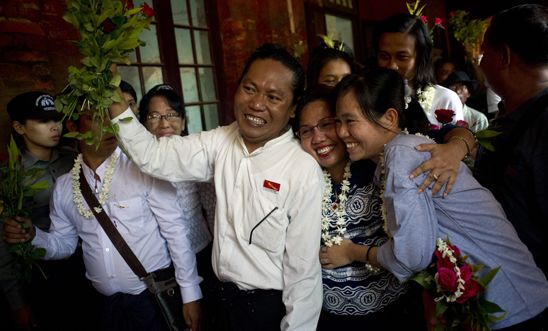
Burma frees student protesters

Burma has released scores of students imprisoned simply for exercising their human rights today, including student union leader Phyoe Phyoe Aung and her husband Lin Htet Naing.
All charges dropped in prisoner amnesty
At a court in the town of Tharrawaddy, the student protesters had all charges against them dropped.
The releases follow the government's announcement on 7 April that it would work to release all prisoners of conscience at the first possible opportunity. We are extremely glad to see that promise start being fulfilled.
Releasing the students sends a strong message that the government of Burma intends to stop punishing people for expressing political beliefs. We now look forward to the release of all other prisoners of conscience in the country.
Phyoe Phyoe Aung: the student leader punished for protesting
Phyoe Phyoe Aung is the Secretary General of prominent student union the All Burma Federation Student Union. Student unions are illegal in Burma.
Phyoe Phyoe Aung was imprisoned on 10 March 2015 for charges relating to student demonstrations she helped organise in February and March 2015. The students were protesting against a new education law passed by the government the previous year, which the protesters say limits free speech and democracy in the education system.
On 3 November 2015, Phyoe Phyoe Aung’s husband, Lin Htet Naing, was arrested for allegedly organising the protests – after nearly eight months in hiding.
Prisoners of conscience
Both Phyoe Phyoe Aung and Lin Htet Naing were prisoners of conscience – jailed for peacefully exercised their human right to free speech by criticising the government and attending protests.
In the past, student-led protests have evolved into calls for wider political change. Phyoe Phyoe Aung and Lin Htet Naing were imprisoned following their part in organising the student unions to demonstrate in 2007 – protests that became the ‘Saffron Revolution’. The police violently cracked down on the protesters, and Phyoe Phyoe Aung served over three years in prison for her association with the demonstrations – including a month in solitary confinement.
Student demonstrators beaten while handcuffed at education protests
On 30 September 2014, the Burmese government adopted the National Education Law. Student unions say that under the new law, universities are not independent from the Ministry of Education. The law outlaws student and teacher unions, as well as stopping classes being taught in minority languages in higher education.
Phyoe Phyoe Aung and other student leaders began talks with the authorities in January 2015 to address the students’ concerns. But the talks soon broke down, and the following month the student leaders organised protests in cities across Burma. The authorities briefly listened when faced with the prospect of protests – and ordered the students to stop the demonstrations. But the talks did not progress, leading the students to once again plan protests across four Burmese cities.
The protests took place, and on 10 March police responded with force, beating protesters with batons, even when they had fallen to the ground. Phyoe Phyoe Aung tried to negotiate a peaceful ending to the stand-off with police, but when they started using force she took refuge with others in a nearby monastery. Police surrounded the monastery; Phyoe Phyoe Aung and a friend approached them and offered to disperse the protest if the police refrained from using violence. Instead, the students were handcuffed, sat down in rows and beaten over the heads with batons.
The students were imprisoned and charged with criminal offences, including:
- Taking part in an unlawful assembly
- Rioting
- Committing offences against the state or the public tranquillity.
Many of the students had their charges dropped on 8 April 2016, when they were freed without conditions.